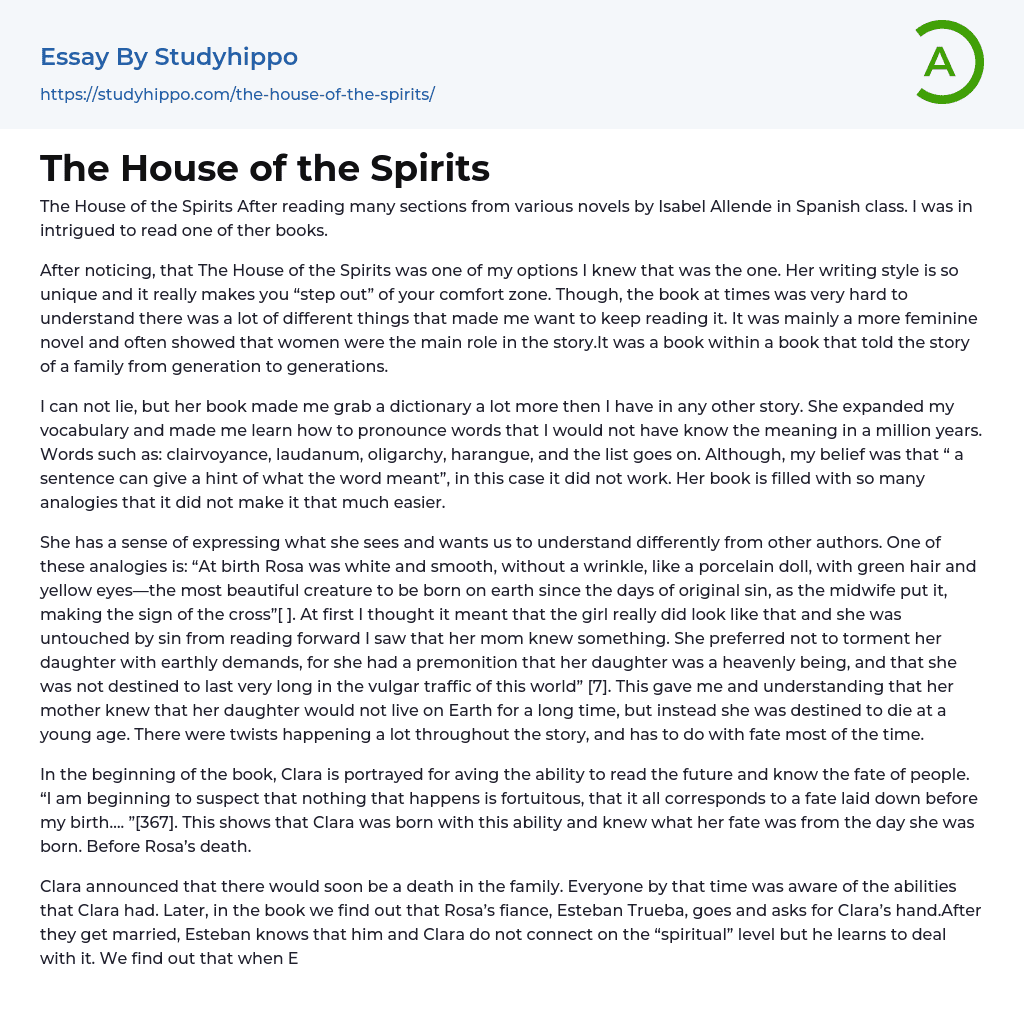Having been captivated by several excerpts from Isabel Allende's novels during my Spanish class, I became interested in reading one of her books, particularly The House of the Spirits.
Upon realizing that The House of the Spirits was a possible choice, I immediately knew it was the one to select. The author's distinctive writing style challenges the reader to venture beyond their comfort zone. Although at times difficult to comprehend, there are several intriguing elements that kept me invested in the story. The novel primarily showcases women as the main characters, resulting in a feminine atmosphere. Additionally, it portrays the history of a family over several generations through a book-within-a-book format.
Admittedly, I found myself reaching for a dictionary more frequently while reading her book than any other story. She skill
...fully expanded my vocabulary and taught me how to pronounce unfamiliar words such as clairvoyance, laudanum, oligarchy, and harangue - to name but a few. My previous assumption that "a sentence can provide clues to a word's meaning" did not hold true with this text, which brimmed with countless analogies that made comprehension all the more challenging.
The author's unique way of expressing her observations sets her apart from other writers. For instance, she uses an analogy in which Rosa is described as a flawless porcelain doll at birth, with green hair and yellow eyes. The midwife called her "the most beautiful creature to be born on earth since the days of original sin" and made the sign of the cross [ ]. Initially, I interpreted this to mean that Rosa's appearance was pristine and untainted by sin. However, as I continued reading, I realize
that Rosa's mother was privy to some knowledge. She chose not to burden her daughter with mundane expectations because she believed that Rosa was not meant to live long in this world. According to her, Rosa was an angelic being whose destiny was to die young [7]. Throughout the story, there are several unexpected turns of fate that add to its intrigue.
At the start of the book, Clara is depicted as possessing the gift of foretelling the future and discerning people's destiny. Her statement, "I am beginning to suspect that nothing that happens is fortuitous, that it all corresponds to a fate laid down before my birth…"[367], implies that this ability was innate, and she knew her own fate since her birth. This was prior to Rosa's passing.
Clara disclosed that a family member would soon pass away, and this was not a surprise since everyone recognized her premonitory powers. Later on, the novel reveals that Esteban Trueba, Rosa's fiance, proposes to Clara. Despite their lack of connection on a spiritual level after getting married, Esteban manages to cope with the situation. It is later discovered that the large house they move into has a steady stream of spirits coming and going, thus earning it the moniker "The House of The Spirits."
In contrast to the time period portrayed, The House of The Spirits emphasizes feminine characters over masculine ones. Clara, Blanca, and Alba are the central figures, while their love interests Esteban, Pedro Tercero, and Miguel take on secondary roles. The women's actions, such as their births and experiences with unjustifiable acts like sexual and physical violence, are heavily described. Despite these challenges, the female
characters remain strong-willed and do not let themselves be brought down by men. The novel also explores themes of childhood innocence and growth. According to the book, many children can fly like birds, guess other people's dreams, and communicate with ghosts but eventually lose these abilities with a loss of innocence. [8]
My understanding is that the women in the novel represent a notion of "innocence" within humanity. Despite their pursuit of their desires, they do so through peaceful means. In contrast to American historical figures who resorted to violence in fighting for their rights, these women enact change more subtly and without inciting rebellion. This speaks to Isabel Allende's understated beliefs.
From the story, she suggests that the impact of what women do is more enduring than that of men. Women's teachings on health and management remain intact for longer, while men in government often implement plans that create more problems than before, without lasting forever. Although the book had many themes to explore, each one required unique and careful consideration, making it a challenging read.
Allende has broadened my literary horizons, motivating me to read more works of a similar nature. I recommend this book predominantly to those who enjoy reading complex and distinctive literature, similar in style to the writing of Garcia Marquez.
- Cleaning essays
- Book Summary essays
- Metaphor essays
- Reader essays
- Rhyme essays
- Literary devices essays
- Villain essays
- Books essays
- Genre essays
- Literary Criticism essays
- Writer essays
- Protagonist essays
- Simile essays
- Poem essays
- Book Report essays
- Book Review essays
- Greek Mythology essays
- Plot essays
- Tragic Hero essays
- Coming of Age essays
- Play essays
- Rhetoric essays
- Rhetorical Question essays
- Translation essays
- Understanding essays
- Reason essays
- Character essays
- Letter essays
- American Literature essays
- Literature Review essays
- Utopia essays
- Poetry Analysis essays
- Dante's Inferno essays
- Between The World and Me essays
- Incidents in The Life of a Slave Girl essays
- Flowers for Algernon essays
- Myth essays
- Everyday Use essays
- Boo Radley essays
- Genesis essays
- Richard iii essays
- Alice in Wonderland essays
- On the road essays
- Ozymandias essays
- The Nightingale essays
- Holden Caulfield essays
- Animal Farm essays
- 1984 essays
- A Hanging essays
- Shooting An Elephant essays




